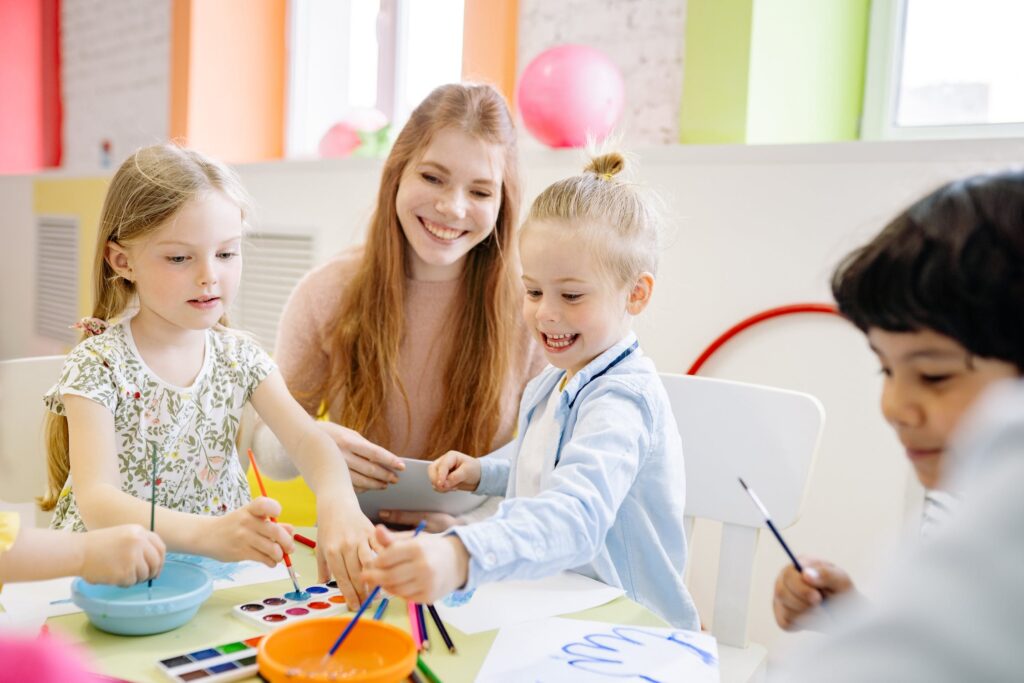Montessori education has recently gained much popularity — and with good reason! Montessori provides young children with a method for learning that appeals to their innate desire to explore their world. The Montessori classroom promotes children’s self-discipline, concentration, cooperation, creativity, flexibility, and responsibility.
As children grow and learn, they develop independence and self-confidence that many say is unsurpassed. It’s no wonder that more and more parents are choosing Montessori for their children. This article focuses on the possible outcomes when children use a Montessori education system.
How Does Montessori Education Impact Children?
Montessori education is a unique approach to how children learn. The idea of the Montessori method was developed by Maria Montessori, which is grounded in the belief that young children have a natural desire and ability to learn. When provided with the proper setting, which includes freedom to choose, order, and cooperation with their environment and materials, children are “instructed” as they play.
When it comes to children’s education, Montessori schools are one of the most popular choices for parents. These are the possible outcomes when children use a Montessori education system:
Increased Engagement and Academic Success
Montessori methods are based on the idea that children learn best through hands-on, self-directed exploration. It is a child-centered approach to learning that emphasizes their natural desire to explore and discover things independently. Children in Montessori programs are encouraged to make mistakes, which they will inevitably do; even at the youngest age, kids are developing their own personalities!
Also, creativity is valued above all else.
Creativity isn’t just encouraged in Montessori classrooms — it’s celebrated! Children are taught how to be more creative by playing with materials designed for open-ended exploration. This type of educational environment encourages kids to think outside the box and look at things from new perspectives — fine skills that will serve them well throughout life!
A Love for Learning
As children are exposed to their environment, different materials, and activities, they begin to develop a love for learning. The choice of materials is an essential aspect of the Montessori method. In this way, children are introduced to resources that will best interest them and help them learn in their own unique way.
Through guided discovery, the Montessori method teaches children what they can do on their own — and builds self-confidence as they explore their environment.
The Ability to Focus & Concentrate
One of the benefits of Montessori education is increased focus and concentration.
Although young children are often viewed as being hyperactive, the truth is that most kids find it difficult to sit still for long periods of time. With Montessori methods, however, children learn how to focus their attention on specific activities for short periods and then move on to something else.
The freedom in the Montessori classroom allows children to fully explore all aspects of a certain activity before moving on. Plus, they are provided with varying tools and media to promote creativity and keep their minds active.
Adaptability & Sensitivity
Montessori education teaches children to be flexible and to adapt to change.
In a Montessori classroom, children acquire the skills they need to adjust based on what they learn and what they need in their lives. These skills can be used in many different ways throughout the years.
- Sensitivity to others:
As a child, you learn it’s not good to be selfish. Your needs and wants matter, but not as much as those around you. As such, you are trained from a young age to be selfless and understand the needs of others first.
- Sensitivity to one’s environment:
You are taught early on to be mindful and aware of your surroundings. You develop a strong sense of respect for nature and act with caution, which benefits you as you grow up.
- Sensitivity to your own body:
You learn that it’s OK to be different — and that there’s nothing wrong with being unique from your classmates.
- Adaptability to change:
As a child, it’s difficult for you to see the big picture. You note details and learn from them.
Skills in Leadership & Teamwork
To develop independence and a sense of self-confidence, you are given opportunities to lead and work in teams.
Teamwork is a skill that many Montessori students develop at a young age. By working together to achieve the same goal, they learn valuable skills like:
- Being part of a team
- Exercising leadership skills by being responsible for their team’s performance
- Everyone being equal in the eyes of the leader: everyone has something important to offer to accomplish their goals together.
- All team members work hard to find and implement the best solution to a problem
Children are also encouraged to take on different leadership roles throughout the program. Montessori education instills the values of equality, respect, and fairness, which help students develop the skills needed to be leaders and team players.
A Strong Sense of Responsibility
As you become more independent, you learn to take responsibility for your actions. Montessori individuals gain the confidence they need to embrace their childhood dreams, recognize their own abilities, and go after their goals.
At young ages, children are taught to take responsibility for everything that goes on in their lives. They learn how to make good decisions and live with the consequences of those choices.
When children are given more freedom in a Montessori classroom, they know what to expect from themselves when taking care of their responsibilities at home and in school.
A Well Managed & Disciplined Individual
A child is taught to be dependable and conscientious, which helps them develop the skills and character traits they need to be successful adults.
The Montessori method promotes self-discipline and develops the skills to follow the rules and guidelines.
- They can maintain and manage their personal space.
- They can interact with people properly.
- They will be able to think logically and rationally.
- They will take care of their own belongings.
- They will learn the value of hard work and the importance of being punctual.
- They are taught to be honest, polite, and respectful towards others.
Sports & Exercise
Montessori education promotes physical and mental health and prepares children for what their future may hold.
Montessori methods stress the benefits of exercise and sports and how they can contribute to building an individual’s character. Their overall health and fitness are a key part of Montessori education.
Sports & exercise are used as an outlet for children to release energy. They learn to be active and move in different ways. Furthermore, Montessori students learn about sports and exercise’s physical and mental wellness. They are taught the importance of avoiding certain exercises and activities — especially those that pose a danger.
These are some of the sports and activities that are encouraged in a Montessori environment:
- Basketball, badminton, tennis, and volleyball
- Swimming and running
- Soccer, football, baseball, cricket, hockey, and other team games & sports
- Skating, biking, and other outdoor activities.
Exercises that are part of Montessori education include:
- stretching and calisthenics,
- breathing exercises,
- movement games.
Social Skills & Language Development
As a child, you learn how to relate to others and how to build friendships.
Montessori education advocates the importance of building social skills as well as language development. Learning how to communicate with others is a key part of Montessori education. Language is not taught in isolation but within the context and oral languages in life situations, such as songs and stories. Children are encouraged to communicate their thoughts and ideas through conversation with adults, pupils, or themselves.
Conclusion
The Montessori approach to learning encourages independence, socialization, and respect for the environment. Children learn that they are unique individuals with many different talents. They begin to understand their place in the world and how it fits into the scheme.
Author bio
Andrea Gibbs is the Content Manager at SpringHive Web Agency, where she helps create content for their clients’ blogs and websites. She is currently a blog contributor at Montessori Academy, a blog dedicated to helping parents with the ins and outs of parenting children within the Montessori tradition. She enjoys spending time with her family and dog when she isn’t writing.
Link: https://montessori-academy.com/blog/how-montessori-education-builds-your-child-self-confidence/

